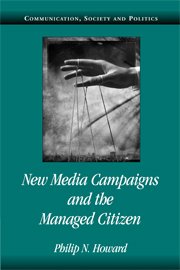Book contents
- Frontmatter
- Contents
- List of Tables and Figures
- Acknowledgments
- Prologue: The Flows of Information in Competitive Politics
- Introduction: The Hypermedia Campaign
- 1 Political Communication and Information Technology
- 2 Producing the Hypermedia Campaign
- 3 Learning Politics from the Hypermedia Campaign
- 4 Organizational Communication in the Hypermedia Campaign
- 5 Managed Citizenship and Information Technology
- Appendix: Method Notes on Studying Information Technology and Political Communication
- Glossary
- References
- Index
- Titles in the series
Appendix: Method Notes on Studying Information Technology and Political Communication
Published online by Cambridge University Press: 15 December 2009
- Frontmatter
- Contents
- List of Tables and Figures
- Acknowledgments
- Prologue: The Flows of Information in Competitive Politics
- Introduction: The Hypermedia Campaign
- 1 Political Communication and Information Technology
- 2 Producing the Hypermedia Campaign
- 3 Learning Politics from the Hypermedia Campaign
- 4 Organizational Communication in the Hypermedia Campaign
- 5 Managed Citizenship and Information Technology
- Appendix: Method Notes on Studying Information Technology and Political Communication
- Glossary
- References
- Index
- Titles in the series
Summary
What has studying communication systems of political schemata, over media effects, meant for my method and findings? First, I treated technological innovation as evolutionary and contextual, not revolutionary and causal. The literature on media effects is occupied with either claiming or debunking the technological revolution in politics. I argued that a more sensible analytical frame treats technological innovation as co-evolutionary with organizational behavior. I still made arguments about what is new, and old, and different, but I did so with the language of evolution in technological systems and social institutions, not with the language of revolution. Second, I treated politics as a set of public discursive phenomena and private strategic choices. The discursive phenomena of digital politics were revealed in the Introduction through the images of digital democracy, and in chapter 4 through the rhetoric of e-politics industry ideologues. The private strategic choices of campaign managers were revealed in chapters 2 and 3 through ethnographic experience with four campaign consultancies. The images and rhetoric tantalize public imagination about how technology might be used to improve democracy; the private strategic choices of campaign managers actually brought information technology to political life, both improving and denigrating democratic norms in complex ways. An analytical frame that treats politics as culture pre-empts the quest for simple media effects and enables exposure of the subtleties of life a digital democracy, particularly with regard to the means of citizenship and representation and underlying logic by which political communication is organized.
- Type
- Chapter
- Information
- New Media Campaigns and the Managed Citizen , pp. 205 - 238Publisher: Cambridge University PressPrint publication year: 2005

